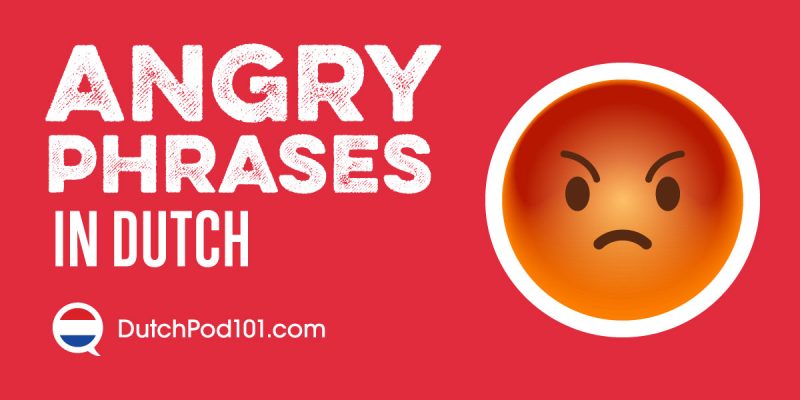Dutch Swear Words Exposed: 10 Shocking Phrases You Won’t Believe

Understanding the language and culture of a country can be an eye-opening experience, especially when it comes to learning about the more colorful aspects of its vernacular. In the Netherlands, just like in many other cultures, there are a variety of swear words that reflect a range of emotions, from frustration to disbelief. If you’ve ever been curious about the more scandalous side of Dutch language, you’re in for a treat. This article will delve into ten shocking Dutch swear words and phrases that might surprise you. Be prepared to be amazed by the rich, and sometimes provocative, expressions of Dutch culture.
Kanker – The Dutch Swear Word You Should Avoid
One of the most notorious Dutch swear words is “kanker,” which translates to “cancer” in English. This term is used as a highly offensive expletive and is considered extremely vulgar. Its usage is akin to using a serious illness as an insult, which is why it’s particularly shocking and hurtful. It’s important to be aware of its impact and to avoid using it in any context.
Kut – A Profanity with Strong Connotations
Another harsh Dutch swear word is “kut,” which means “cunt” in English. This term is used to describe a variety of negative situations or to insult someone. It’s a very offensive word in Dutch, much like its English counterpart, and should be avoided in polite conversation. Its usage can lead to serious repercussions if used inappropriately.
Tering – An Insult with Historical Roots
The word “tering” is another Dutch swear word that translates to “consumption” in English, referring to tuberculosis. Historically, it was used to describe someone who was wasting away due to illness, but today it’s used as a curse word. It’s often paired with other words to amplify its impact, making it a powerful, albeit offensive, term in Dutch.
Zeuren – A Mildly Annoying Swear Word
While not as harsh as others, “zeuren” means “to whine” or “to nag” in Dutch. It’s often used to describe someone who is being excessively irritating or complaining constantly. Although it’s less offensive than some of the other words on this list, it still carries a negative connotation and should be used carefully.
Lul – A Common but Impolite Term
The word “lul” translates to “dick” in English and is commonly used to describe someone who is acting foolishly or ineptly. It’s a vulgar term but not as severe as some of the other Dutch swear words. Still, it’s best used with caution, as it can be quite offensive depending on the context.
Hufter – A Strong Term for a Jerk
“Hufter” is a term used to describe someone who is a jerk or an asshole. It’s a strong insult in Dutch and can be quite hurtful. The word itself carries a lot of negative weight, so it’s important to consider your words carefully if you’re feeling frustrated.
Godverdomme – A Religious Swear Word
The term “Godverdomme” is a combination of “God” and “damn” and is used to express extreme frustration or anger. It’s a religious swear word that is deeply offensive to many people because it involves taking the Lord’s name in vain. It’s a powerful expression of anger but should be avoided if you want to steer clear of religiously charged insults.
Pissig – Annoyed or Irritated
“Pissig” is a term used to describe someone who is annoyed or pissed off. It’s a less severe swear word compared to others on this list but still carries a connotation of irritation. It’s commonly used in everyday language to express frustration.
Eikel – A Term for a Fool
The word “eikel” translates to “nut” or “dickhead” in English and is used to describe someone who is acting like a fool or is being annoying. While it’s not as harsh as some of the other Dutch swear words, it’s still a derogatory term and should be used with caution.
Sukkel – A Mildly Insulting Term
Finally, “sukkel” is a term used to describe someone who is clumsy or foolish. It’s a milder form of insult compared to some of the other swear words on this list, but it still has a negative connotation. It’s often used in a more lighthearted manner but can still be offensive.
Conclusion
Dutch swear words and phrases offer a fascinating glimpse into the emotional and cultural expressions of the Netherlands. From the highly offensive “kanker” to the milder “sukkel,” each term reveals a different aspect of how Dutch speakers express frustration, irritation, or disdain. Understanding these words not only enriches your knowledge of the Dutch language but also helps you navigate social interactions with greater sensitivity.
While it can be interesting to learn about these swear words, it’s crucial to approach them with respect and caution. Using offensive language, especially when you’re not fully immersed in the culture, can lead to misunderstandings and discomfort. Always be mindful of your audience and the context in which you use such terms.
FAQs
Q1. Are Dutch swear words commonly used in everyday conversation?
Dutch swear words are used in various contexts, but their frequency depends on the individual and the situation. While some people may use them regularly, others might avoid them altogether. Understanding their impact and using them with caution is essential.
Q2. How do Dutch swear words compare to their English counterparts?
Many Dutch swear words have similar connotations to their English counterparts, but their intensity and impact can vary. Some Dutch swear words are more offensive than their English equivalents, while others might be less severe.
Q3. Can using Dutch swear words be considered offensive in the Netherlands?
Yes, using Dutch swear words can be considered offensive, especially if used inappropriately or with strangers. It’s important to be aware of the context and the people you’re speaking to when using such language.
Q4. Are there any Dutch swear words that are less offensive?
Yes, some swear words in Dutch are less severe than others. For example, “pissig” and “sukkel” are milder terms compared to “kanker” or “kut.” However, even less offensive terms can still be harmful depending on the context.
Q5. How can I learn more about Dutch language and culture?
To learn more about Dutch language and culture, consider taking language classes, watching Dutch films and TV shows, or engaging with Dutch speakers. Understanding cultural nuances and context will help you navigate the language more effectively.
Also read: City of Tilburg: 10 Incredible Places Every Foodie Needs to Try











